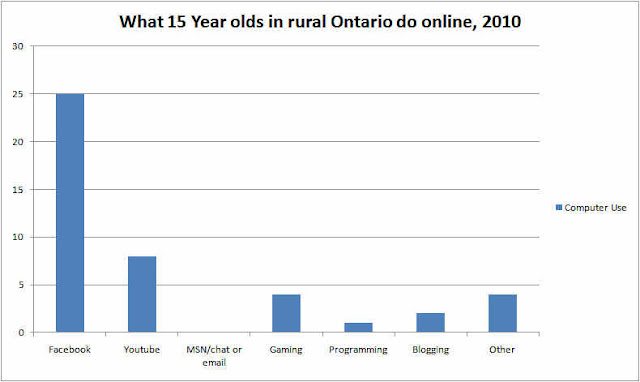There's something to be said for being the first settler. You have to be self directed, self sufficient, an explorer. You experience the risks, suffer the failures alone and get a feel for the new world you find yourself by spending quiet moments in silence together away from the static of opinion and politics.
Later, as waves of immigrants reach a critical mass you see them bringing all the bad habits of the world they left behind with them. They never had the opportunity to learn what the new world is telling them because they've never been alone in it. They aren't interested in what the new world offers, they want to recreate what they left behind. Whole political and social structures make this migration.
In the summer of 2005, only a year after I became a teacher, I signed up for summer school teaching only to have them ask (based on my technical background) if I'd be willing to give elearning a try. I leapt at the opportunity. Summer school was run in Peel by a separate business entity, and they were aggressively pursuing alternate means of course delivery. It was an exciting opportunity that came to me years before the Ontario Ministry of Education even started on elearning.
The online Learning Management System Peel summer school had selected was Angel. It was HTML friendly but often required hands on coding to get graphics and other information online. What it had going for it was flexibility and freedom. It was a blank slate that I could populate with my own material. I could easily add links to outside resources and quickly got a handle on how to post up to date statistics to give students constant feedback.
I had students from across Ontario, 3 other provinces in Canada, Tokyo, Japan and Bangkok, Thailand. Peel summer school offered the course globally (overseas students could use the grade in proving their ESL proficiency prior to going to an English speaking university). I was buzzing with the possibilities of what a global classroom would look like because I was observing one of the first. The student conversations were wonderful to follow, so full of curiosity.
This was the year after Zuckerberg left Havard to found his little startup. This was years before the first tweet. Phones were still phones. In the dark fibre of the Internet before social media, we had a global classroom. This was before the majority of students were psychologically (pathologically?) locked into the same three webpages whenever they went online.
You couldn't walk into the digital Wild West like that and expect to serve everyone. The admission requirements demanded that you were proficient on a computer, knew how to get about on the internets, and were a capable student. There wasn't a lot of room in the digital wilderness for spoon feeding the directionless learner. The teacher knew how to code webpages, knowing how to simply open a browser was insufficient. The students were digital ninjas, doing everything from their own IT support to working a system that still had the wrapping on it.
There was no real idea on how to do final exams. We elected to run them in a 2 hour window on the last day of the course. You had to login to the course, have your IP validated by me, and then write the final exam online, live, while I observed remotely.
One of the student's internet went down just as the exam started. She called around until she found a friend out of the affected area, then she jumped on her bike and pedaled over there, got back online and finished the exam... on time, and well. She also got barbaric yawps from myself and the rest of her classmates who recognized the energy and thinking that went into a fix with no excuses. The students in Tokyo and Bangkok? Up at 2am in the morning to write the exam. They sent up webcam pictures of themselves with the city lights on outside... it was a sunny morning in Ontario. That exam ran simultaneously in 7 timezones.
 |
| The Ontario Ministry of Education works its way into elearning |
Elearning was now going to be organized, efficient, and a cure-all for every credit poor student. They gave me a class full of drop outs from non-academic English. In the first week fully half of them failed to login. There was no local support for these digitally and traditionally illiterate students. It was a stark contrast from my first experience with elearning where students would perform super human feats of daring-do in order to get it working - the course was aimed at those students; a higher bar to strain the limits of the gifted learner.
Half a dozen survived to the end of the basic level English course, which I had to keep cutting content out of because the poor English students were drowning in the text-heavy online deliver system the Ministry had adopted. It was a disaster, and utterly frustrating - and every student was from my board, the furthest only 60 kms away. It was about as magical as road kill.
The next year they changed the head of elearning and in the Byzantine logic of my board, other teachers, many with no experience at all, were handed elearning courses. I could get none.
 |
| Blended learning stats from 2010 |
The stats from my blended class supported my suspicions about what a successful elearner looks like - the vast majority of students don't have the technical aptitude or the literary chops to manage elearning, especially when it's in an embryonic, text-heavy stage. I ended up having to print out sections of the course so the weakest literacy students could manage the material. Many more had a devil of a time trying to do anything useful with a computer and the internet, which they had only previously experienced as a toy and time waster (a new socialization that wasn't an issue eight years ago).
The intrinsically motivated learner who explores independently and develops their own understandings, who spreads their knowledge where it wants to go, unrestricted by curriculum or what comes out of a teacher's mouth... that elearner is a small proportion of the general population. I'd noted that the same division lies in just about everyone, including teachers. Intrinsically motivated learners are a rare breed.
That year I heard of Digital Natives and almost threw up in my mouth. There is no such thing. There are capable, early adopter students who are self directed in their learning and can manage digital tools, and then there are the other 80%, most of whom are capable of learning what is needed to survive if not thrive in online learning. The weakest 10%, dogged by weak literacy skills (no doubt a result of their poor learning habits) were incapable of interacting with computers in any meaningful way.
The fact that we are beginning to expect this proficiency in all students is worrying, especially if we're reaching for it at the cost of basic skills, like literacy.
So here I am, about to go back into an elearning class for the first time in several years next semester. I fear the digital stupification of people - though that's not an accurate representation. It's more a matter of these hordes of digital immigrants flooding the new world with their analogue habits; people being led here by social expectation rather than any particular predilection or interest on their part.
As someone who had a farmstead on the frontiers of the digital world since the early days, I'm looking at these wide-eyed, immigrants with a steely eye, my hands calloused with the work of building the digital frontier in which they want reside, but have no interest in understanding what it is or how it works.
I'm glad I had a chance to do elearning clear of the politics and the expectations of a bunch of bureaucrats who knew nothing about what they were demanding out of a new technology. In those vast, empty digital plains, we took elearning places where it can't go any more because of Ministries, Consortiums , funding formulas and the modern expectations and demands of carefully managed and coddled digital usage.
Dire Straits: Telegraph Road
